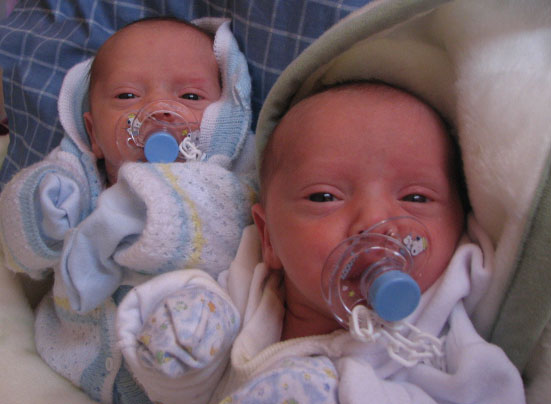We might have to get used to the idea that identical twins are not quite the same after all, say researchers in the US.
 Harvard's Andrew Chess and his team, writing in this week's Science, have found that of the two copies of each of our genes (one from our father and one from our mother), in at least 10% of cases one of the genes is randomly shut off. This means that in some tissues just the paternal copy of the gene is active, whilst in other tissues it's just the maternal gene. But the switch off process isn't genetically determined - it takes place at random during development. So a stem cell makes a decision to deactivate one of the pair of genes, and then all of its progeny inherit that pattern. Alternatively, a different group of cells may leave both genes switched on. As a result, twins, which were previously believed to be genetically identical, are almost certainly running subtly different "genetic programmes" throughout their bodies. They contain the same DNA as each other, but may well be switching on different bits of it.
Harvard's Andrew Chess and his team, writing in this week's Science, have found that of the two copies of each of our genes (one from our father and one from our mother), in at least 10% of cases one of the genes is randomly shut off. This means that in some tissues just the paternal copy of the gene is active, whilst in other tissues it's just the maternal gene. But the switch off process isn't genetically determined - it takes place at random during development. So a stem cell makes a decision to deactivate one of the pair of genes, and then all of its progeny inherit that pattern. Alternatively, a different group of cells may leave both genes switched on. As a result, twins, which were previously believed to be genetically identical, are almost certainly running subtly different "genetic programmes" throughout their bodies. They contain the same DNA as each other, but may well be switching on different bits of it.
But what's the significance of the finding? Some diseases, such as cancers, are caused by the loss of function of genes that stop cell proliferation. So if an individual already has one defective copy of one of these anti-cancer genes, but then deactivates the healthy copy in certain tissues, this could trigger tumour formation. Alternatively, failure to switch off one of the copies of a gene can lead to too much of that gene product, again triggering disease. An example of this is Alzheimer's Disease, where overactivity of the beta-APP gene is linked to the formation of dementia-provoking protein plaques in the brain.










Comments
Add a comment